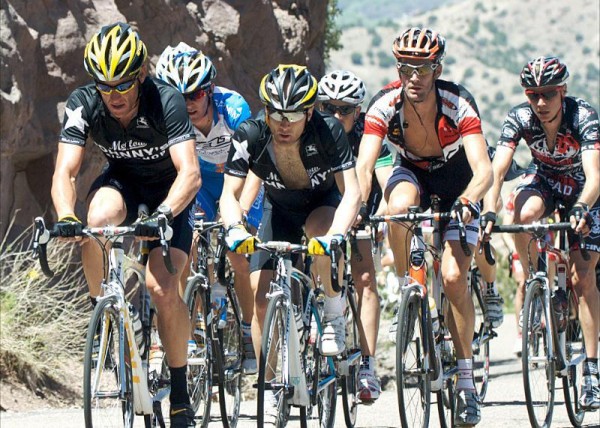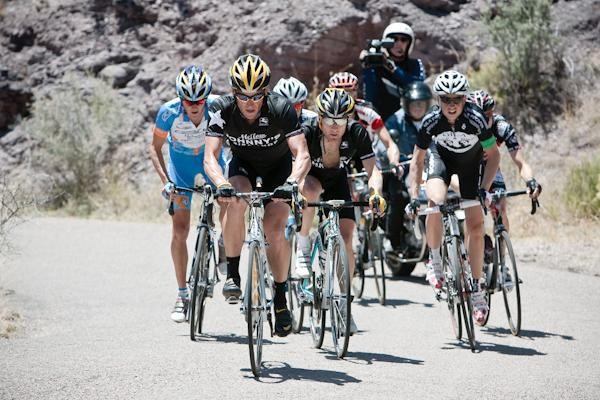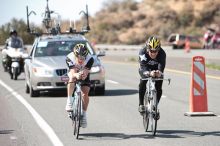Lance Armstrong: Under no pressure for the Giro
Lance Armstrong has taken a decidedly low-key approach to preparing for his first Grand Tour in nearly four years



The Astana trio made headlines earlier this week when they were denied entry into the New Mexico stage race called Tour of the Gila by the UCI. After a quick conference between USA Cycling and the world governing body of the sport, the three were allowed to race under a neutral jersey.
Racing under the guise of Armstrong's bike shop "Mellow Johnny's", the trio has dominated the popular domestic race and gotten worldwide attention for an event which faced cancellation just a few months ago.
Armstrong talked about his low-key approach to his Giro d'Italia preparations, the infamous 'showergate', and how his return to the sport could affect his legacy if he fails to live up to expectations.
Cyclingnews: Any sense of what people think of the Tour of the Gila in Europe?
Lance Armstrong: They are definitely paying attention. They dissect the results, look at the pictures and the positions. A guy like [Ivan] Basso for sure is reading about the race every day, word for word, especially the time trial stage. And of course they are showing it on CNN international. For sure they are watching.
CN: People think you are cherry picking events. Is that a fair comment?
LA: Cycling has to get away from that. I don't care which way you cut it, this is good for cycling. We are happy to be here. SRAM was generous enough to pick this race up when it was about to die. Obviously I have a relationship with them from an investors standpoint, but we are not taking any prize money.
Get The Leadout Newsletter
The latest race content, interviews, features, reviews and expert buying guides, direct to your inbox!
I would understand if we came and we said 'we want appearance money, we are going to take the prize money and we are leaving.' But we are here hanging out with everyone, staying in borrowed housing like everyone else and we are giving the prize money back to the other classes in the other fields.
'Showergate'
CN: Obviously the biggest talking point since your crash has been regarding the AFLD and 'showergate'. How do you deal with it when every step you take is a headline?
LA: That was a story because people didn't understand the facts. Just imagine that a stranger comes to your home, alone, and says they are 'somebody official'. They then declare that you have to let them in order to take your urine, blood and cut your hair. Honestly, if you asked anyone on the street in the United States of America 'is it cool if I come in and make you pee in this cup, stick this syringe in your arm and give you a hair cut,' they would call the police.
I simply wanted to confirm his identity, take a shower and then get about my business. I think the social networking part (twitter) of it was me telling the story for the first time ever.
In the end it was neutral or positive story for me and a negative one for them (AFLD). It's not a competition but I'm not letting strangers into my home.
I have to make it clear that he was alone and I've never had a control where the person has been alone, ever. There was just something weird about it. I had Johan Bruyneel, Chris [Van Roosbroeck - his mechanic], Richard and Dean all with me and they all agreed that this was strange. I called a time-out before I let him walk through the gate, that's all.
CN: Can you speculate why Pierre Bordry hasn't come out since the case was dropped and made an official statement?
LA: I think once they dropped the case he did say something, but I don't really know. I think that even in France this was looked upon as a bad deal.
CN: Back to 'showergate' for a second. Knowing the rules, did you have any hesitancy in taking a twenty minute shower? Did you not think that somebody could make something of this?
LA: No, I didn't think about it and I would do the same thing today. A lot of these testers are known and recognised, and we, cyclists, invite them in for a cup of coffee. But if it's just some stranger, who is alone and he says he was from NADA and he says, ' I want your urine, your blood and your AIR.'…
I thought to myself, 'no you are not coming in, yet!'
CN: What do you think this all boils down to?
LA: Ultimately, at some point these agencies need to be streamlined. We had Australian controls in Australia and we will have Italian controls when we are in Italy. It's what happens when you have a powerless body of athletes and a powerless number of teams. If you look at the other sports that are mobilized as athletes and teams or federations, that never happens.
The interesting thing is that we put all our whereabouts into the system so that UCI and USADA and WADA has access so they know our address and phone number. AFLD does not have access to ADAMS, so this guy figured out where I was through another way and sought me out. It was a little weird.
CN: What more do you think you can do to be more transparent?
LA: I asked Paul Kimmage if he wanted to sleep with me in my bed and spoon up every night. But seriously, there is nothing more I can do and nothing more than I should have to do. The majority of the people are cool. They say these guys are the most talented; they work the hardest; they have they have the most experience; they race the smartest and they have the best team, therefore they should win, period. However, the most successful guys always seem to get blamed.
Beijing Positives
CN: Last week's news was dominated by the positive tests that came out of the Beijing Olympics. How did you react to the news?
LA: I was disappointed on a lot of levels. Firstly because these athletes had a mind set to cheat and that they thought they had a substance that wasn't going to show up. They took that risk. That was a stupid chance and stupid decision. It is also disappointing that of the six people who were positive, the cyclists are the first two names that are made public. If everything is confirmed, it is just another bad story that we have to get over.
The Giro
CN: Moving back to your own racing schedule and preparation. You were famous for knowing the Tour de France intimately and previewing all the stages. Have you previewed the Giro stages and if not, why the change?
LA: Obviously I haven't studied the courses for the Giro or the Tour. For the Tour, I'm just relying on my experience. I've previewed the opening time trial and the Giro TT, but that's it.
CN: Are you still taking the Giro seriously?
LA: Yes, but I just haven't had time between commitments in the US, the foundation and kid time. I just haven't had time to base out of Europe and hit all these things. It's not ideal but I'd rather go to some of my son's football games than go ride around France alone and preview stages.
CN: But what does the collarbone break do for your preparations? Surely the plans and the goal posts have to change?
LA: I can't deny that having a crash, a surgery and all the things involved with it, completely derails any ambitions. And in March I wasn't in condition to win the Giro anyway as I was still in the process of building my form.
This was a difficult setback, but I don't think that it's a bad thing. I think the team will be coy about our chances in the Giro, but I think we have a strong guy [Levi Leipheimer] and that works perfectly for me.
I get to ride with no pressure, do an event that I've always wanted to do and get to help a guy try to win the Giro.
CN: What does the Giro mean to you, what are you looking forward to?
LA: Outside of the Tour de France, it's as big as it gets. If you look at the past winners, the history and that it is in its 100th anniversary, it just makes it so significant.
If you look at the riders who have won, from Coppi to Bartali, to Hampsten to Indurain, all the greats went there and did it, and most of them won. It's something I've wanted to experience and I also have a long history with Italy. It's mythical and I don't think many events in cycling have that mystique.
Comeback
CN: How do you feel your comeback is going and how has it effected your legacy?
LA: I think it's going okay but obviously the crash complicated things. But before that, I think I could say that it was probably going better than expected and maybe a little ahead of schedule, but now we are playing catch-up. I have no pressure to be in peak condition at the start of the Giro and no pressure to win. I will just ride and we, the team, will see what happens as a group. Beyond that, there is the Tour which is what everyone will look to.
Talking about legacy, the Tour is where, I would say, if I don't win, it could be a blemish on a perfect record. But I knew that when I decided to comeback. Nothing says that I get to automatically win after being away from the Tour for four years. It's not an easy challenge but there are other aspects to it that will judge whether my comeback was a success.
If I was judged on just racing and I'd made that my goal, than yes, that would be disappointing. But that has not been my goal.
I can already feel that the time off and being almost 38-years-old means it's not a walk in the park. But I think people are happy to see us all racing in Australia, California, New Mexico, the Giro and the Tour. People are stoked. You get your occasional people who whine here and there but that's cycling. There are not a lot of whiners but there are a few loud whiners. But I tune that out which I think most guys do, too.